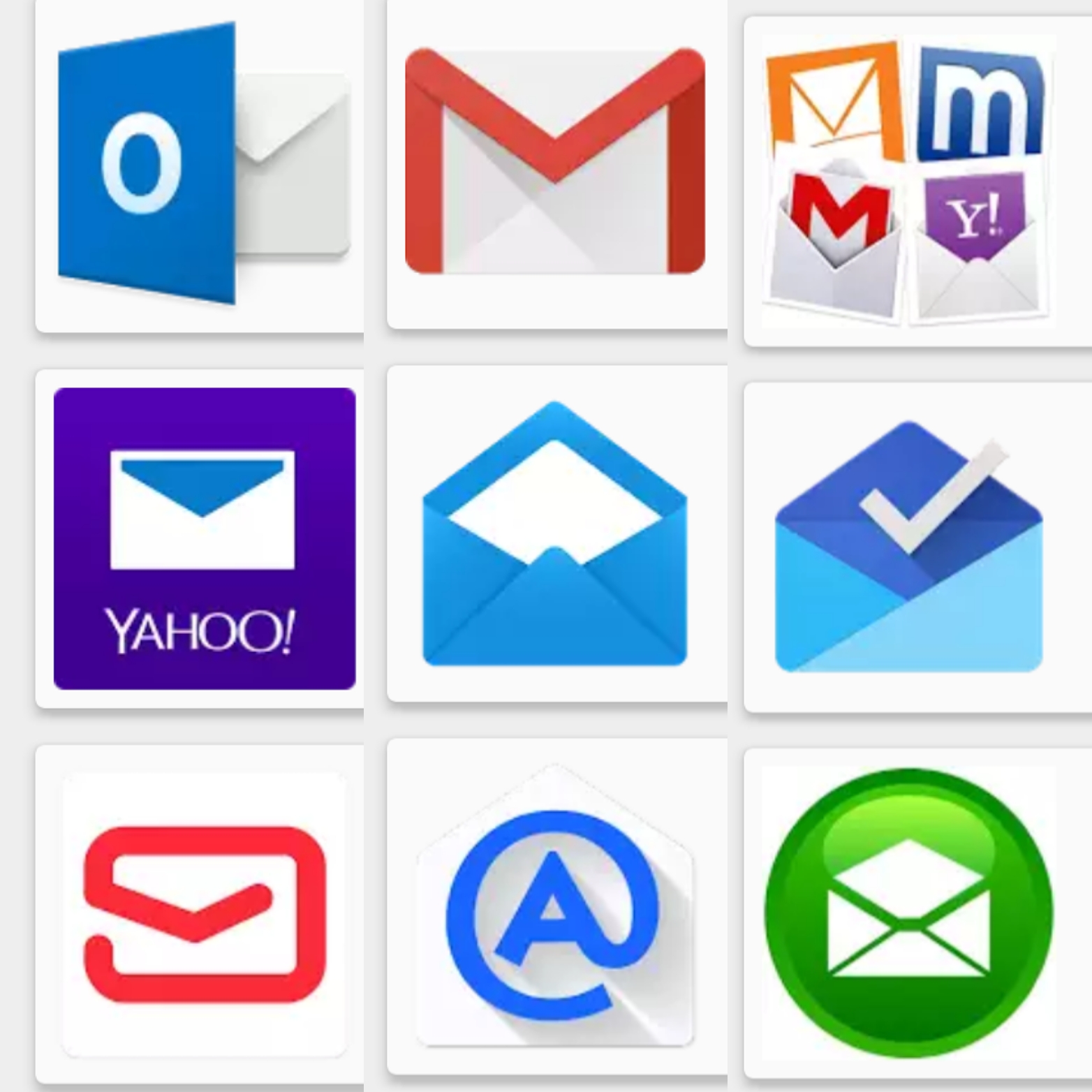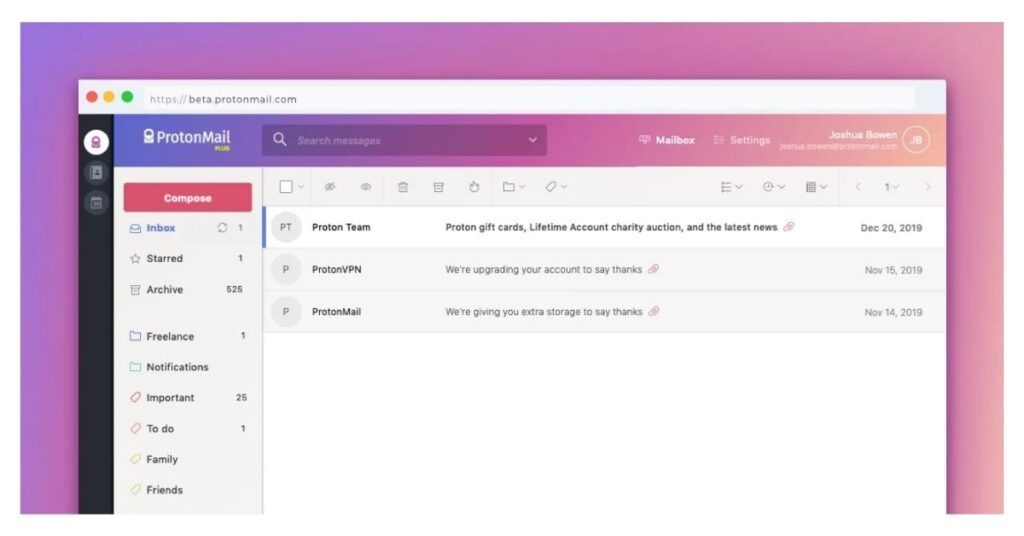Gmail vs Apple mail vs Protonmail vs Yahoo vs Hotmail: Today, we have brought the grand comparison between all the measure mailing services and softwares.
After reading this article, you will be easily able to differentiate between these services and it will be much easier to find one best service fo you.
Gmail vs Apple mail vs Protonmail vs Yahoo vs Hotmail: Comparison
Gmail has been the most popular email service on the globe since its launch in 2004, with 1.5 billion users worldwide. It is one of the most adaptable and practical email platforms available.
It supports rich customization via a variety of plugins in addition to its built-in features. That, combined with Gmail’s strong search capabilities and the fact that it is secure, makes it a little wondrous.
Unfortunately, Gmail has had its fair share of problems, almost all of which revolve around user privacy. Despite Google’s announcement in 2017 that it will no longer search consumer emails to target advertisements, Doug MacMillan of the Wall Street Journal revealed last year that certain Gmail users who have linked select third-party apps to their account may have inadvertently offered human staff permission to read their emails.
Not to mention the fact that Google’s programs already search your Gmails (though not for ad targeting) so its AI can help produce “Smart Answers”—quick text replies a person can send to someone who has emailed them. The content of the email you receive is used to create these excerpts.
Oh, and Gmail maintains track of the online purchases and keeps a record of them. The receipts that online stores send to your Gmail address are used to build your shopping history.
Gmail is not the only one with this issue. Users’ emails are scanned by most big free email services, including Yahoo, for ad tracking and data collection purposes. Apple’s iCloud is an exception—as long as you pay for an Apple decal.
In 2020, Gmail, Yahoo, and Apple will be three of the most common email services for personal and business use. In the fact that they all perform the same basic functions of receiving and transmitting emails, each has its own range of advantages and disadvantages.
We will go through the functionality, prices, and overall utility of each provider in this article to help you decide which is the right fit for your business. If you will not go wrong with either of these three, you should also read our guide to the best email providers for more details.
The most successful email hosting services among Gmail vs Apple mail vs protonmail vs yahoo vs hotmail.
Best email clients: Applications and applications available for free and for a fee
Characteristics of Gmail vs Apple mail vs Protonmail vs Yahoo vs Hotmail
All three interfaces are readily available on a number of computers and operating systems. Yahoo provides internet access and has smartphone applications for both iOS and Android devices. Gmail also offers a plugin plugin for Google Chrome in addition to these features.
Although Apple does not have a browser plugin, you can use the iCloud web program for Windows to access your email address. The iCloud suite, which is built into the macOS operating system, includes Apple’s email tools. Users on Macs can set up and maintain their accounts in System Preferences, and access emails in the Mail window.

Each provider allows users to connect external addresses to their mailbox in addition to personal email accounts. They are all equipped with powerful spam filters that keep unnecessary messages out of your inbox. If the filter makes an error, individual addresses will be blacklisted or whitelisted.
Although Apple, Yahoo, and Gmail both provide free storage, Yahoo outperforms the competition by providing 1,000 GB, opposed to Google’s 15 GB and Apple’s 5 GB.
Both Apple Mail and Gmail, unlike Yahoo Mail, are part of broader productivity suites that provide file sharing and other features. Users of Google Drive and iCloud Drive have volume caps that extend to their entire account.
Users of Google Drive and iCloud Drive will hold images and other data, but these capacity restrictions extend to the entire account. Both Google and Apple charge a fee for additional storage.
Exercising
Gmail, iCloud Mail, and Yahoo are all compatible with all computers, but Apple Mail is particularly well-suited to Apple hardware. Although the interface is primarily a matter of personal preference, iCloud has a lot of features.
iCloud has a more simplified look, with more room for each message and less items on each page, although the gui is mostly a matter of personal preference.
Emails in iCloud and Gmail share storage with a lot of other records, which may be a problem for users. If you run out of space, you can need to uninstall old emails or other files.
Despite the fact that these platforms have new opportunities, G Suite is much more available than other iCloud programs. G Suite, for example, allows real-time interactive editing through a web interface, while iCloud’s real-time editing capabilities are only available on Mac computers.
Yahoo, on the other hand, has a lot of dedicated disk space, with 1,000 GB only for communications. The vast majority of consumers would never have to think about running out of bandwidth or needing to make space for fresh emails.
In terms of organisation, alongside its robust spam blocker, Gmail goes beyond and beyond by automatically sorting emails into multiple groups such as Main, Promotions, and Social. This makes it easy to identify various kinds of emails, while ensuring that only the most relevant messages enter your inbox.
Support
Google, Yahoo, and Apple all have informative help centers that cover common questions and technical issues. Additionally, Google and Apple both run community support forums to connect people who have questions with experienced users.
Unfortunately, Apple was the only company that offered live service, with the ability to dial right away or schedule a call. If a user has an issue with the mobile mail service, there is no live Yahoo support. Similarly, Google only provides live service to G Suite subscribers, which costs $6 per customer per month.
Plans and pricing
Irrespective of the provider you prefer, creating an email address is totally free. Both Yahoo and Gmail, however, allow you to create premium custom email addresses for your company’s website. Giving everyone on your staff the same email domain will make the brand look more professional and streamline communication.
After a 14-day free trial, custom Gmail addresses cost $6 per account per month. This payment also provides a number of extra services, such as file sharing, 30 GB of cloud storage, and 24/7 customer service.
Yahoo charges $3.19 a month for a single address, $1.59 per mailbox per month for five emails, and $1.19 each mailbox per month for ten addresses, with bulk rates required for bigger teams. These rates are for an annual subscription; if you do not want to stay for so long, you can pay extra. 1 TB of data is also included with business mailboxes.
Hotmail is a free email service.
Outlook.com, like all big webmail systems, employs Ajax programming methods and is compatible with the most recent versions of Internet Explorer, Firefox, Safari, and Google Chrome. Any of its features include keyboard controls for navigating the website without using the mouse, the ability to scan the user’s messages using formal query syntax such as “from:ebay,” and the ability to search the user’s messages using structured query syntax such as “from:ebay”.
Message filters, folder-based message organizing, auto-completion of email addresses when writing, contact grouping, importing and exporting of contacts as CSV files, rich text layout, rich text signatures, spam filtering and virus scanning, compatibility for multiple addresses, and multi language variants are all accessible.
The ability to make custom doms is one example of a functionality that is no longer available.
Protonmail

One of the most well-known email alternatives. After the Edward Snowden revelations, ProtonMail was launched in 2014. The business is headquartered in Switzerland and boasts that no one, even ProtonMail, will read your emails. This is due to the fact that ProtonMail has solid end-to-end email protection and also saves all messages and attachments in an encrypted format as they are stored on the server.
One disadvantage of ProtonMail is that, while emails are encrypted end-to-end, subject lines are not. This means that a hacker may potentially access the email subject lines but not the message itself. Nonetheless, ProtonMail has more anonymity than Gmail. Anyone can sign up for a free account, but they are limited to just 500 MB of email storage.
And, yes, no one enjoys paying for email while services like Yahoo and Google have it for free. (Gmail provides up to 15 GB of free storage with the ability to upgrade; Yahoo Mail delivers a staggering 1 TB of free storage.) Those accounts, though, are only free because you pay for them with your privacy and (ad-supported) focus. ProtonMail’s business model, like many others, is based on encryption.
What criteria do you use to choose an email service provider among Gmail vs Apple mail vs protonmail vs yahoo vs hotmail?
When selecting an email provider, the following are the most relevant considerations to consider:
The reputation of your email service provider should be optimistic. Your email address is one of the first things consumers see.
Email providers with good archive capabilities allow you to copy, store, archive, and scan your notes.
- When choosing an email service, search for one that has robust security features. It protects your email address from unwanted entry and lets you keep your messages secure.
- Some email platforms integrate well with other business software, such as productivity suites and calendars.
- Spam Filter: You do not want to read spam messages because they waste your time. As a result, you will need an email service with a spam detection and filtering system.
- Reliability: Anytime you need it, the email service provider should be up and running. Email outages may lead to dissatisfied or missing customers.
- Storage is a vital consideration when choosing an email service provider. It would be beneficial if you held in mind the amount of available storage space for your account.
- Ease of Use: As the company expands, your employees may need to build and use email accounts. You must seek out an email service provider that is simple to use in order to minimize staff preparation time.
- Advanced Functions: Based on the specific business needs, advanced functionality such as the ability to plan activities or recall notifications are available.
What is the best email service in the midst of Gmail vs Apple mail vs protonmail vs yahoo vs hotmail?
In 2021, the best email service providers are:
- ProtonMail is an email service that focuses on encryption and privacy.
- Gmail is a free email service. The juggernaut that is Google’s webmail needs no introduction. ……
- Perspective. There is a lot of power here, particularly if you are using Office 365. ……
- Yahoo Mail is a web-based email service. A strong offering with some unexpectedly useful extras. ……
- Zoho is a software company based in the United States.
Which email account is the safest to use?
Our curated list of the top ten secure email services
- ProtonMail – best ratio of price and privacy. ……
- Tutanota – Best safe email for any laptop. ……
- Zoho Mail is a component of the best B2B security suite. ……
- Thexyz has a great set of applications. ……
- Startmail is the perfect email for people who only use their computers for email.
